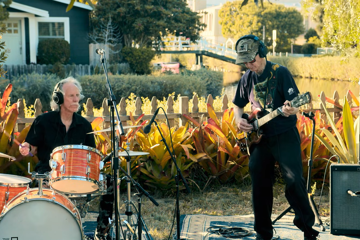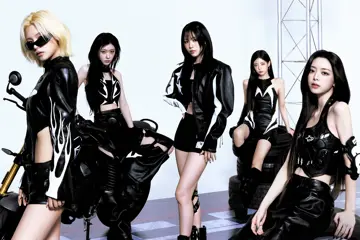I FEEL PRETTY

I Feel Pretty is a movie with a mixed-message problem. It’s a film about body-image whose ultimate message —delivered, therein, at a product launch for a cosmetics company— is the kind of generic, all-inclusive banality so often used to sell cosmetics: you’re beautiful just the way you are! You do you, girl!
Except, along the way, writer-directors Abby Kohn and Marc Silverstein deliver pretty much the opposite of that message. Whilst the film may wheel out final-act moralising about self-acceptance and self-confidence, there’s none of that inspirationalism in its sitcom contrivance. Instead, its entire, utterly-unfunny comic premise is, essentially, ‘Look at the fatty who thinks she’s hot! LOL!’
It stars the descending Amy Schumer, who, less than three years ago, delivered the scathing male-gaze-in-the-entertainment-biz satire 12 Angry Men Inside Amy Schumer. For those who found her Judd Apatow-pimped movie breakout, Trainwreck, to be troublingly normcore, I Feel Pretty makes it feel positively subversive in comparison.
Here, Schumer plays the ‘everywoman’ familiar from rom-coms: a single gal living in the genre-fairytale version of New York (the discrepancy between shitty job and the amazing apartment is palpable), a klutz who falls over in mirthless pratfalls, and someone who’s horrifically self-obsessed.
Don't miss a beat with our FREE daily newsletter
In a bit of pitch-meeting movie-magic that openly tips its cap to Big, our heroine undergoes a body-swap comedy… with herself. After getting knocked out in a very-branded gym class —this film is a veritable orgy of sponcon and placed products— she suddenly sees an idealised version of herself in the mirror. In short, suffering from what’s, likely, a traumatic-brain-injury, she now believes herself to be thin. We don’t see her imaginary reflection, and she never explicitly says the word thin, but there’s also a scene where Schumer offers that she can eat whatever she wants “and still look like this”.
This is the ‘comedy’ of I Feel Pretty: in her delusion, Schumer’s character swaggers around like she’s all that! She’s not even a 10! By the time she “hilariously” decides to enter a wet t-shirt contest, the film reaches its nadir: showing that, for all its attempts to gin up a positive message, there’s not a single shred of gender politics or social critique herein; it's objectification taken at face value.
In this way, the film’s moralising finale feels more like a critique of its intended female audience than reassurance (fitting, given that it’s trying to impart the it’s-what’s-inside-that-counts message whilst also selling you make-up —lots and lots of make-up— and gym memberships). Were a viewer to share Schumer’s body-type, they would’ve seen that body-type made the subject of jokes for 90 minutes. Only to, at the climax, be told to feel great about that body. With the implication being that it’s their own fault if they don’t; that self-confidence comes from within as if external societal factors don’t matter.
During the main character’s inspirational speech near the end —after she realises, like Dumbo without his feather, that the magic was inside her all along!— our everywoman wonders when the “little girl confidence” of childhood suddenly turns into self-doubt, self-loathing, body image issues. She says this as if it’s a rhetorical question, a riddle with no answer. Never does Kohn and Silverstein’s screenplay dare to examine the culture-wide sexualisation that soon follows those carefree little-girl years, and that is used to define women thereafter.
Instead of addressing the way that such patriarchal appraisal is wed to the industries of fashion/cosmetics/self-help/women’s-mags/gossip-culture —toxic judgment and beauty standards firmly entrenched to cynically prey upon the insecurities of consumers— I Feel Pretty, instead, delivers a virulent dose of shaming and blaming: first finding ‘comedy’ from fat-shaming, then lecturing women on not feeling better about themselves. For anyone —of any body-type, and any gender— who suffers through this witless, clueless car-crash, they’re sure to come out the other side feeling worse.
ABRACADABRA

Speaking of body-swap sitcom hijinks: in following up 2012’s Blancanieves, his silent, surrealist riff on Snow White, Pablo Berger has made a very-broad comedy with its own fantastical premise. Abracadabra —a centrepiece film in the currently-running Spanish Film Festival— stars Maribel Verdú as a long-suffering housewife, married to Antonio de la Torre, the Iberian-macho stereotype made manifest (soccer-mad, violent, possessive, etc). In a moment of co-hypnosis turned magical movie monkeyshines, unloveable hubby comes out of trance acting like a new man: He’s not a prick anymore! He does the dishes! He’s no longer too stupid to help their daughter with her maths homework! He doesn’t threaten to beat them up!
It turns out, he’s become possessed by the spirit of a long-dead dutiful-son, who grew up tending to his infirm, overbearing mother, only to ultimately murder her, then his co-workers. Thus begets a comic mystery —an existential detective story?— in which the secrets of the past must be unravelled in order to avert tragedy in the present or something. For all its moments of sketch-show-esque comedy (swingers, aren’t they funny!), Abracadabra is plenty wacky; shot through with ridiculous superstition. Ultimately, this housewife fantasy ends as it must: with Verdú ditching both murderous ghost and misogynist husband, striding towards the horizon as an independent woman. Whilst it’s a lot weirder than most rom-coms of its ilk, for fans of Blancanieves that glass-half-full will sure seem like a glass-half-empty.
THE GUERNSEY LITERARY and POTATO PEEL pie SOCIETY

Beyond its whimsical title and source-text valentine to book-clubs, The Guernsey Literary And Potato Peel Pie Society is a familiar bit of contemporary cinematic fodder: another twee film about WWII and The Blitz, made for the silver-haired set that flock to daytime arthouse screenings in search of the non-threatening. And non-threatening this is: Mike Newell —yeah, that guy— adapting a crowd-pleasing book whose story is a variation on that old city-slicker-is-charmed-by-smalltown-community theme. And, in true movie-biz fashion, this film about a woman finding a spiritual home in Guernsey wasn’t even shot on location, but in Devon and Cornwall.
Here, Lily James plays a London author who, in 1946, ends up, by dint of shared literary love, in the Channel Islands, on Guernsey, where she meets a colourful cast of locals. They’re not just salt-of-the-Earth types, but ones harbouring dark secrets, baggage hauled from the island’s recent occupation by the Nazis; said secrets duly melted out, slowly and surely, over three very conventional acts. James’ dissatisfaction with London and her warming to Guernsey gets, of course, embodied in twin rivals for her affections: Glen Powell a clean-shaven Yankee soldier who proposes to her in the first act, Michiel Huisman an unshaven, pig-farmin’ single-dad with a heart of gold. Eventually, things end with a vintage riff on the rom-com’s familiar race-to-the-airport finale; only, this time, it’s a race to the harbour for a ferry. Speaking of overplayed tropes: James, therein, writes a book about her experiences in the preceding story, which has the same name as the film. Whilst there’s a great cast (Tom Courtenay!) ladling on the charms, they can’t do much to elevate something so dependant on formula.
LAST FLAG FLYING

Last Flag Flying is a film about the anger of veterans, set against the second Gulf War, in 2003. A trio of old Marines buddies —meek Steve Carell, loudmouthed Bryan Cranston, preachin’ Laurence Fishburne— are brought back together after three decades apart, old wounds opened up as history repeats. Carell’s son —who we never meet, never see on screen— has died in Iraq, so he digs up his old mates to help him through the attendant military funeral. Sadly, this set-up sends our three men on a cross-country road trip, which means wacky adventures, colourful characters, secrets arising from the past, and the destination not mattering as much as the journey. For all its ire —at America’s treatment of the soldiers it sends to distant wars, at the lies a warmongering government tells, at the scourge of unchecked patriotism— there’s a sense of formula in the narrative that dulls its message.
This story was initially written by Darryl Ponicsan, as a 35-years-on companion to his 1970 novel The Last Detail. That book was brought to screen by Hal Ashby in 1973, which makes Last Flag Flying a kind of quasi-sequel. It’s helmed by Richard Linklater, the ultra-prolific filmmaker who, in between his passion projects, shows he’s unafraid of touring through different genres, stories. Linklater’s direction here is wholly workmanlike; showing that he remains a far superior writer to a director. As filmmaker, he recedes behind the material, which here means behind a charismatic trio of actors, but also behind a narrative big on convention.
GURRUMUL

It’s the hit record of the year no one saw coming: traditional songlines and chants of the Yolngu, sung in the Gumatj language, married to minimalist modern-classical arrangements. That’s Gurrumul’s Djarimirri (Child Of The Rainbow), the final album for the acclaimed singer, recently released after his death last July. This eponymous, companion-piece documentary fills in the details of his story: blind since birth, he grew up a musical prodigy on Elcho Island in Arnhem Land, playing in Yothu Yindi and the Saltwater Band before, eventually, going solo. Gurrumul’s records never needed that biography to sell them, the power of his music embodied in his glorious tenor, the kind of voice that can immediately still a room, quiet a crowd. Director Paul Williams employs this effect in his own film: it gets rolling with a rockumentary’s bluster, showing archival footage of the early discovery of his talents, various bands on tour through the years, and talking heads praising his music, before suddenly stopping, arrested by the magic and power of an acapella studio vocal.
The film, in turn, seeks to be not simply a life story of an artist, but a portrait of his cultural effect; looking at how music, that universal language, crosses lines of culture and can function as a bridge between different societies, or divided elements of the same country. Whilst Michael Hohnen, Gurrumul’s career-long collaborateur and beloved 'brother', is a constant figure throughout —be it holding onto the musician’s arm as they walk off stage, or talking to-camera— Williams’ best way of addressing perspectives of culture is having Gurrumul’s aunt, Susan Dhangal Gurruwiwi, serve as the film’s narrator; she, too, bridging worlds in her words, speaking aloud themes and detailing the meaning of music, of song, in Gumatj culture. But Gurrumul’s narrative is never —unlike in most rockumentaries— anchored by talking heads, playing out in the past. Williams followed the musician for years, and as life happens —both Gurrumul’s parents dying, their funeral rites filmed— profundity piles up; cinema, as ever, best used as an artform to explore the passage of time.
THE SONG KEEPERS

Here’s another documentary about musical cultural exchange, with Australia’s indigenous history stitched through as unavoidable subtext. The Central Australian Aboriginal Women’s Choir is made up of people from Western Areyonga, a remote community in the MacDonnell Ranges, west of Alice Springs. They sing traditional hymns taught to them by German Lutheran missionaries 140 years ago, translated into local languages, Pitjantjatjara and Arrernte. As these hymns have been passed down through generations, they’ve lost their original colonialist tenor; becoming a part of local tradition. This is cultural exchange at work: this music steeped in dual heritage, songs existing in their own place, in between cultures.
Director Naina Sen —who previously toured with Gurrumul, handling live visual projections— tags along as the Choir visit Germany, performing these sacred songs in the churches that birthed them. It’s the first trip overseas for its members, and when one offers “we get treated better [in Germany] than what we do back home”, the spectre that lingers, throughout, is spoken aloud. Nothing about The Song Keepers is confrontational, least of all its form: there’s talking heads, heartstring-tugging score, and a warm air of feelgood. But Sen has made the film as its own extension of the idea of songlines: documenting oral tradition and the passage of culture, and the erasure of ancient languages and cultures. Here, the cross-cultural on-the-road documentary is rewritten as pointed social critique: if this Choir are warmly received overseas, but unknown at home, what does that say about Australian society?
I AM NOT A WITCH

A movie about a girl who’s stigmatised as a witch in rural Zambia sounds like a recipe for a ‘plight of’ movie: a po-faced, earnest, tragic portrait of third-world suffering. Instead, I Am Not A Witch is, unexpectedly, hilarious. There’s enough darkness looming beneath its narrative that you probably have to call it a tragicomedy, but director Rungano Nyoni looks at her superstitious social milieu and plays it for satire. Shula (Maggie Mulubwa) is an 8-year-old orphan accused of witchcraft. Forever silent, she’s a blank slate upon which anything can be projected, which makes her a great figure to blame for failures of fate, nature, or male society. She’s sent to a local witch-camp, where women are tethered to ribbons like dogs on leads, told that if they cut the ribbon, they’ll turn into goats. Rather than being a site of human-rights-violation horror, this camp is a tourist attraction, busloads of Westerners coming through to see this idiosyncratic local attraction and snap selfies alongside supposed witches.
Nyoni’s directorial approach is safely art-movie: carefully composed, with ironic musical queues and a deadpan air; prime cinematography comes from David Gallego, last seen lensing Ciro Guerra’s psychedelic colonialist journey Embrace Of The Serpent. But what makes her satire resound is the way that —despite the film’s title— witchcraft remains unquestioned in front of the camera; this entrenched social belief persisting even into the digital now. A local government official (Henry B.J. Phiri), takes Shula on board as his own personal witch, getting her to solve crimes like some glorified police dog. When he brings her on TV, seeking publicity for the ‘unusual’ fact this witch is a child, I Am Not A Witch reaches its satirical apex; Nyoni’s impressive debut a place where the cinematic sublime meets the sociological absurd.
LOVELESS

Loveless is the latest film for Russian auteur Andrey Zvyagintsev, a veritable titan of European art cinema. As with his previous pictures —The Return, The Banishment, Elena, and Leviathan— this is another glowering, stern, meticulously-mounted work of lingering symbolism and poetic airs, carrying with it a parable on contemporary Russia. In a Moscow high-rise, we inhabit the bourgie life of an unhappily married couple: Maryana Spivak a selfie-snapping, Facebook-swiping, blonde trophy-wife; Aleksey Rozin a perpetually-pissed-off salaryman being ground down by his careerism. Each has taken on a new lover, but they’ve stayed together to keep up appearances; Rozin’s boss the kind of 'hardcore Christian' who’d demote a man who got a divorce. If they do get a separation, one thing’s for sure: neither one of them wants to look after their unwanted son, Matvey Novikov.
When their son goes missing, the two of them are brought back together; not just united in tragedy, but in the search for a kid that the wry, unruffled, seen-it-all local cops don’t have much motivation to look for once the trail turns cold. Zvyagintsev, of course, has no interest in giving this couple —or the audience— the catharsis of a boy returned back home, and the opportunities for atonement that come with. Instead, our couple fight and fight, sinking, together, into a quagmire of toxic anger, resentment, guilt, blame. He sets this dysfunction against images of urban decay, and, eventually, TV coverage of the war in Ukraine. There’s no easy answers or simple pleasures; Loveless a film for those who like their film foreboding, heavy, and filled with bad weather.















